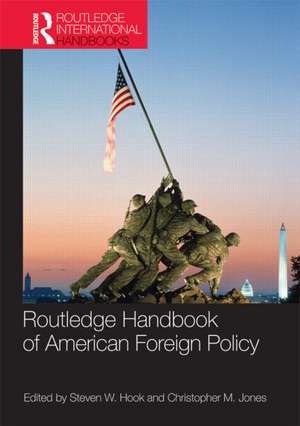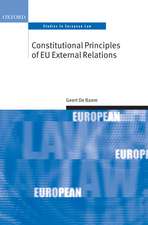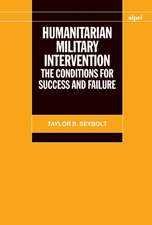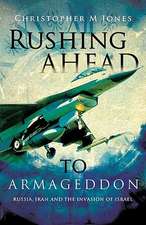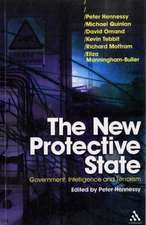Routledge Handbook of American Foreign Policy
Editat de Steven W. Hook, Christopher M. Jonesen Limba Engleză Paperback – 14 feb 2013
This volume provides a systematic overview of all aspects of American foreign policy and drives the agenda for further, cutting edge research. Contributors bring analytic depth and breadth to both the ways in which this subject is approached and the substance of policy formulation and process. The Handbook is an invaluable resource to students, researchers, scholars, and journalists trying to make sense of the broader debates in international relations.
| Toate formatele și edițiile | Preț | Express |
|---|---|---|
| Paperback (1) | 584.47 lei 6-8 săpt. | |
| Taylor & Francis – 14 feb 2013 | 584.47 lei 6-8 săpt. | |
| Hardback (1) | 1618.30 lei 6-8 săpt. | |
| Taylor & Francis – 31 aug 2011 | 1618.30 lei 6-8 săpt. |
Preț: 584.47 lei
Preț vechi: 687.61 lei
-15% Nou
111.87€ • 116.35$ • 93.74£
Carte tipărită la comandă
Livrare economică 13-27 martie
Specificații
ISBN-10: 0415800951
Pagini: 478
Ilustrații: 5 tables, 6 line drawings and Following Routledge H'Book Public Diplomacy
Dimensiuni: 178 x 254 x 27 mm
Greutate: 0.9 kg
Ediția:1
Editura: Taylor & Francis
Colecția Routledge
Locul publicării:Oxford, United Kingdom
Cuprins
Part I: Research Traditions and Historical Experience 1. The Study of American Foreign Policy Margaret G. Hermann 2. Diplomatic History James M. McCormick 3. America in the Cold War Robert D. Schulzinger 4. The Post-Cold War Era Steven W. Hook Part II: Theoretical Perspectives 5. Realism Henry R. Nau 6. Liberalism Alynna J. Lyon 7. Critical Theories Howard J. Wiarda and Ann P. Kryzanek 8. Constructivism Jennifer Sterling-Folker and Dina Badie 9. Bureaucratic Politics Christopher M. Jones 10. Individual and Group Decision Making Mark Schafer Part III: State Actors 11. The Presidency Glenn P. Hastedt 12. The National Security Council Vincent A. Auger 13. The Department of State Jerel Rosati and Scott DeWitt 14. The Department of Defense Peter J. Dombrowski 15. National Security Intelligence Loch K. Johnson 16. The Foreign Economic Bureaucracy I.M. "Mac" Destler 17. Congress Ralph G. Carter and James M. Scott 18. Law and Courts Gordon Silverstein Part IV: Non-State Actors 19. Public Opinion Douglas C. Foyle 20. News Media Douglas A. Van Belle 21. Interest Groups Patrick J. Haney 22. Multilateralism Laura Neack Part V: Policy Instruments 23. The Use of Military Force Brandon C. Prins and Mark Souva 24. Economic Sanctions David Lektzian and Mark Souva 25. Foreign Aid Marijke Breuning and Christopher Linebarger Part VI: Transnational Challenges 26. Weapons Proliferation and Arms Control Dan Caldwell 27. Counterterrorism Bradley A. Thayer 28. Global Trade Terrence Guay 29. Human Rights Shannon Lindsey Blanton and David L. Cingranelli 30. Environmental Policy Michael E. Kraft 31. The Balance of Power R. William Ayres
Notă biografică
Steven W. Hook is professor and chair of the Department of Political Science at Kent State University.
Christopher M. Jones is professor of Political Science and associate vice provost for university honors at Northern Illinois University.
Recenzii
—Charles W. Kegley, Carnegie Council for Ethics in International Affairs and former President of the International Studies Association
"This outstanding volume belongs in the library of all serious students of American foreign policy. The thirty-one chapters effectively analyze the historical background, theoretical perspectives, state actors, and important challenges that confront the United States. All readers—whether neophytes or seasoned professionals—will profit from these fine essays."
—Ole Holsti, Duke University
"This is the most authoritative collection yet available on the subject of American foreign policy. The comprehensiveness of this work, along with the high quality of the contributors, will make the Handbook a standard reference in the field for years to come."
—Patrick James, University of Southern California
"The Routledge Handbook of American Foreign Policy has assembled in one volume a veritable who’s who of influential scholars to survey all aspects of U.S. foreign policy, including history, theory, issues, actors, and practice. The Handbook will be an indispensable source in courses such as American Foreign Policy, International Relations Theory, Foreign Policy Analysis, and National Security Policy, at both the graduate and even the advanced undergraduate level. It will occupy a prominent place on my shelf."
—Valerie M. Hudson, Brigham Young University
"I was planning my fall book order and bemoaning the dearth of up-to-date books on American foreign policy appropriate to both graduate and undergraduate students when I learned of this volume. It fits the bill exactly. The editors have assembled an all-star cast to write balanced surveys in their areas of expertise. The comprehensive coverage includes key historical eras, alternative theoretical approaches, governmental and societal actors, policy instruments, and transnational challenges. I’m much happier about my course reading lists with this excellent book now in the lineup." —Andrew Bennett, Georgetown University
"Summing Up: Recommended. General readers, undergraduate students, and practitioners."
—M. Amstutz, CHOICE (March 2012)
Descriere
No nation has maintained such an immense stature in world politics as the United States has since the Cold War’s end. In the wake of the 9/11 attacks, prompting the global war on terrorism and the U.S. invasion of Afghanistan and Iraq, along with American economic and "soft power" primacy, there has been increased interest in and scrutiny of American foreign policy. The Routledge Handbook of American Foreign Policy brings together leading experts in the field to examine current trends in the way scholars study the history and theories of American conduct in the world, analysis of state and non-state actors and their tools in conducting policy, and the dynamics of a variety of pressing transnational challenges facing the United States.
This volume provides a systematic overview of all aspects of American foreign policy and drives the agenda for further, cutting edge research. Contributors bring analytic depth and breadth to both the ways in which this subject is approached and the substance of policy formulation and process. The Handbook is an invaluable resource to students, researchers, scholars, and journalists trying to make sense of the broader debates in international relations.
